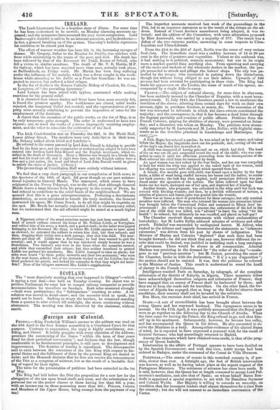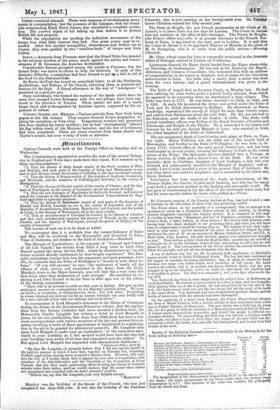jforeign anb
PitussiA.—King Frederick William's answer to the address was read on the 23d April to the four Estates assembled in a Combined Court for that purpose. Contrary to expectation, the reply is highly conciliatory, con- fiding, and liberal. It boldly grapples with every objection of the address; promises the summoning of the States "within the term of four years fixed for their periodical convocation"; and declares that the law, though unalterable in its fundamental principles, is still open to development and improvement. The doctrine of finality is repudiated. The discrepancies said to exist between the intentions of the late King with respect to Im- perial States and the fulfilment of them by the present King are denied to exist; and the Monarch declares that he does not receive the remonstrance of the Diet as a symptom of mistrust, but as the result of a laudable feel- ing of regard for their rights.
The term for the presentation of petitions had been extended to the 1st of May.
The King had laid before the Diet the proposition for a new law for the abrogation of the tax upon bread-stuffs and meat, and the substitution of a personal tax on the poorer classes or those having less than 601. a year, with an inoome-tax on those possessing more than 601.; Princes, Counts, and Members of the Upper House, being exempt from the payment of any fax!
The imperfect amounts received last week of the proceedings in the Diet, led to an incorrect statement as to the result of the debate on the ad- dress. Instead of Count Arnim's amendment being adopted, it was re- jected; and the address of the Committee, with some alterations proposed, by Herr Anerswald, was carried by a majority of 377. The result was a defeat of the two extreme parties, answering in some respects to Ultra- Loyalists and Ultra-Liberals.
From the 21st to the 23d of April, Berlin was the scene of very serious food-riots. The immediate cause was a sudden increase of 15 or 20 per cent in the price of potatoes and vegetables. Violent as the outbreak was, it had nothing in it political, scarcely economical; but was in its origin more a market quarrel than anything else. From upsetting and carrying off the sacks and baskets of the wholesale dealers in the market, the peo- ple proceeded to attack and pillage the bakers' shops. The city was pa-. trolled by the troops; who succeeded in putting down the disturbance, though not without being obliged to use their sabres. Upwards of 10a, persons had been arrested for participating in these riots. The King had made his appearance on the Linden, the scene of much of the uproar, ac- companied by a single Aide-de-camp.
FEANCE.—The subject of colonial slavery, for some time in abeyance,. has been suddenly mooted in the Chamber of Deputies, with a most unex- pected result. In July 1845, the Chambers passed a law to ameliorate the condition of the slaves; allowing them certain days for work on their own account, right to purchase freedom, to marry, &e. The execution of the law was intrusted to tribunals in which the slave-owners constituted the majority; and the consequence is, that it has become a dead letter through the flagrant partiality and evasions of public officers. Petitions from the French Colonies, praying for abolition of slavery, were presented on Satur- day; and a discussion was taken on Monday. The petitions were strenu- ously supported by M. Lasteyrie and M. Ledru Rollin; with frightful state- ments as to the cruelties practised in Gaudeloupe and Martinique. For: ex
A little Negro boy entered a garden; he was seized on by the owner, and"takeir before the Mayor; the Magistrate drew out his penknife, and, cutting off the end of the boy's ear, forced him to swallow it. A child was suspected of having poisoned an ox, which had died. The head of the ox was cut off, and suspended round the neck of the child; who was com- pelled to carry it until the effluvium proceeding from the decomposition of the flesh relieved the child from its torments by death. An aged woman was tied naked by the four limbs, and her son was compelled to hold her while the whip was applied to the naked back of the woman, until her offspring was covered with the blood which spouted from her
A female, five months gone with child, was bound upon a ladder by the font limbs, a billet of wood being stuffed between her bosom and the ladder, to render- her back convex; the lash was then applied, until premature delivery was pro- duced under the operation of the torture. The blows inflicted upon her head, broke out her teeth, destroyed one of her eyes, and deprived her of hearing.
Another female, also pregnant, was submitted to the whip until her back was. covered with bleeding wounds; and then, by a devilish refinement of torture, a solution of pimento and lemon-juice was poured into the wounds. There was at times a show of punishment for these outrages; but only nominal penalties were inflicted. The man who tortured the woman into premature labour was brought before the Correctional Police and sentenced to fifteen days' im- prisonment! An officer who tried to procure due enforcement of the law in the case of the child that was killed, was "advised" to leave the colony "for his health": he refused; but ultimately he was recalled; and placed on haff-pay
The Chamber received these statements with violent exclamations of incredulity; but M. Ledru Rollin adduced minutes of evidence and other proofs. Disbelief was succeeded by undisguised horror. M. Jolivet, who rushed to the tribune and vaguely denounced the statements as "infamous calumnies," was driven from his post by shouts of indignation. The Minister of Marine and Colonies "deplored" that such facts had been brought forward—he did not think that any one, however different the re- sults that could be desired, was justified in unfolding such a long catalogue of grievances. There would be abuses in all communities. Admiral Mackau was persisting in the demand for "the order of the day "—antda- gons to our "previous question ": but M. Guizot, perceiving the sense of the Chamber, broke in with the declaration," Il n' y a pas d'opposition "; the motion should not be resisted. It was, that the petitions be referred to the Minister of Justice. This result is understood to sound the knell of slavery in the French Colonies.
Intelligence reached Paris on Saturday, by telegraph, of the complete submission of the district of Kabylia in Algeria. 'These mountain tribes have acknowledged themselves subjects and tributaries of France; they have engaged that no enemy of France shall be harboured by them; and, they are to keep the roads safe for travellers. On the other hand, the Go- vernor of Algeria has engaged, that so long as the Kabyles:observe these conditions, their country shall not be invaded by the colonists.
Bon Maza, the recreant Arab chief, has arrived in France.
SrAne—A sort of reconciliation has been brought about between the young Queen and her wayward husband. The repugnance seems to be mutual. On the 17th April, it was publicly announced that the Royal pair were to go together on the following day to the Church of Atocha. When the time came for leaving the Palace, the King refused to go, and shut him- self up in his apartment. Subsequently, however, he became less sulky, and has accompanied the Queen in her drives. He also consented to re- ceive the Ministers in a body. Among other evidences of his altered frame of mind, he is reported to have expressed a personal wish for the recall of General Serrano; who had accordingly returned to Madrid.
Among the rumours which have obtained some credit, is that of the preg- nancy of Queen Isabella.
Intervention in the affairs of Portugal appears to have been decided on by the Spanish Government; and with this view, 4,000 troops had been ordered to Badajoz, under the command of the Count de Villa Hermosa.
Ponereme.—The course of events in this wretched country is, if pos- sible, slower than ever. A fortnight ago, the fact of British intervention was known, as well as its having taken place at the urgent request of the Portuguese Ministers. The minimum of advance has since been made. It is said, however, that the Queen has at length consented to accept Lord Pal- merston's mediation, and also that of Spain; on whose behalf Baron Ren- duff° is appointed a special negotiator, to act with Sir Hamilton Seymour and Colonel Wylde. Her Majesty is willing to concede an amnesty, on condition that the insurgent leaders shall absent themselves for a time from the country; but she will not consent to an immediate convocation of the Cortes.
Lisbon remained tranquil. There were rumours of revolutionary move- ments in contemplation; but the presence of the Canopus, with her broad- side commanding Black Horse Square, was considered a complete protec- tion. The avowed object of her taking up that station is to protect British life and property. While the negotiations are pending, the indecisive movements of the troops lose what little interest they had. One great action may be re- corded. After five months' tranquillity, disturbances had broken out at Cintra: they were quelled by two " omnibus-loads " of troops sent from Lisbon.
ITALY.—Accounts from Florence state that the Grand Duke has granted to his subjects freedom of the press; much against the advice and remon- strances of M. Neumann, the Austrian Ambassador.
Considerable distress prevailed among the people at Florence; but the Grand Duke was active in efforts to help the destitute. In spite of this domestic difficulty, a committee had been formed to get itp a ball in aid of the fund for the distressed Irish.
At Rome, the Pope has issued an encyclical letter, to all the Patriarchs, Archbishops, and Bishops of his Church, exhorting them to promote col- lections for the Irish. A liberal allowance in the way of " indulgence " is promised as a quid pro quo.
Sixty individuals, who formed the nucleus of the bands which have for some time ravaged Lower Romagna with fire and pillage, have been cap- tured in the province of Ferrara. These parties are part of a much larger band, said to be organized by Austrian agents, supported by the or
of reform.
UNITED STATES AND MEEIC0.—Various arrivals from New York bring papers to the 9th instant. They contain General Scott's despatches, re- lating his operations at Vera Cruz. Tempestuous weather had prevented him from landing his heavy artillery; but he had" triumphantly" planted his flag within reach of the Mexican batteries; and the line of investment .haa been completed. There are many rumours from Santa Anna's and Taylor's armies, but none worthy of trust or attention.



























 Previous page
Previous page